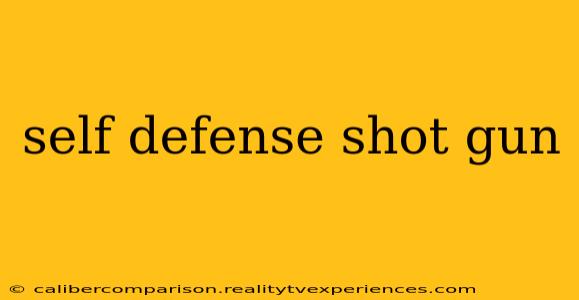Choosing a self-defense shotgun is a significant decision, demanding careful consideration of various factors. This comprehensive guide will delve into the essential aspects to help you make an informed choice, focusing on safety, effectiveness, and legal compliance. We'll explore different shotgun types, ammunition considerations, training needs, and legal responsibilities. Remember, responsible firearm ownership is paramount.
Understanding Shotgun Advantages for Self-Defense
Shotguns offer several advantages in a home-defense scenario:
- Stopping Power: The spread of shotgun pellets delivers significantly more kinetic energy upon impact than a handgun round, increasing the likelihood of stopping a threat quickly.
- Effective at Close Range: Their effectiveness is maximized at close range, typical of home invasions.
- Less Penetration: While penetration can still be a concern depending on the ammunition used, shotgun pellets tend to have less penetration than rifle rounds, reducing the risk of unintended harm to neighbors or bystanders.
- Psychological Deterrent: The sound of a shotgun being racked can be a significant deterrent, potentially preventing an attack altogether.
Choosing the Right Shotgun
Several factors influence the selection of an appropriate self-defense shotgun:
Gauge: 12 vs. 20 Gauge
- 12 Gauge: Offers the most stopping power due to larger shot sizes, but it also has more recoil, which can be challenging for some users.
- 20 Gauge: Lighter recoil makes it easier to handle and shoot accurately, especially for smaller individuals or those new to shotguns. While less powerful than a 12 gauge, it still provides sufficient stopping power at close range.
Action Type: Pump-Action vs. Semi-Automatic
- Pump-Action: Reliable, relatively simple, and generally less expensive. Requires manual operation after each shot.
- Semi-Automatic: Faster follow-up shots, but they can be more expensive and potentially more complex to maintain. Reliability is crucial in a self-defense situation.
Barrel Length:
Shorter barrels are generally easier to maneuver in tight spaces but may have slightly more recoil. Longer barrels offer slightly less recoil but can be less maneuverable. Consider your living space when making this decision.
Accessories:
Consider accessories such as a tactical light and a sling for improved usability and safety.
Ammunition Considerations for Self-Defense
Ammunition selection is critical. Avoid using birdshot or buckshot designed for hunting; they may over-penetrate in a home environment. Here are better options:
- 00 Buckshot: Offers a good balance between stopping power and penetration.
- Reduced-Recoil Buckshot: Minimizes recoil while retaining sufficient stopping power.
- Birdshot (for specific situations): May be suitable only when the risk of overpenetration is minimal and a less lethal option is desired (e.g., dealing with an animal).
Always consult local regulations regarding legal ammunition restrictions for self-defense.
Training: Essential for Responsible Ownership
Effective use of a shotgun requires proper training. Seek professional instruction from a qualified firearms instructor. This training should cover:
- Safe gun handling: The four rules of firearm safety are paramount.
- Proper shooting techniques: Stance, grip, aiming, and follow-through are crucial for accuracy.
- Home defense tactics: Understanding how to use a shotgun effectively in a home defense scenario is vital.
- Legal considerations: Familiarize yourself with the laws concerning the use of deadly force in self-defense in your area.
Legal Responsibilities
Understanding the laws surrounding self-defense is crucial. The legal use of deadly force varies widely by jurisdiction. Familiarize yourself with your local laws and understand the concept of "reasonable force." Consult with a legal professional specializing in self-defense laws for personalized guidance.
Conclusion: Responsible Ownership is Key
A shotgun can be a valuable tool for home defense, but responsible ownership is essential. Careful consideration of the factors discussed above, coupled with thorough training and a deep understanding of relevant laws, is paramount before bringing a shotgun into your home. Always prioritize safety and legal compliance. Remember, this information is for educational purposes only, and it's crucial to consult with relevant professionals for advice tailored to your specific circumstances.

